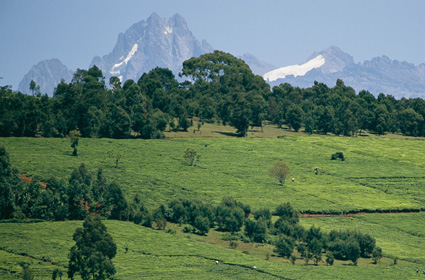Kura and I spent yesterday mapping out our schedule for the north. Since our focus on this trip is to capture as much of our work through the lens of David duChemin, we have decided to concentrate on two villages – Korr and Loiyangalani. We will make stops in Laisamis village to photograph some of our beading groups, visit with Malawan in Ndikir village and then make our way to Ngurunit for shots of the dramatic landscapes of mountain and desert. Kura will go ahead in the Defender to make arrangements. I will drive up in two days time to meet him at the Laisamis campsite.
Today I head back to Nairobi after having spent a few days in Nanyuki (home to BOMA’s office and house) as well as a stay with a friend on the Lewa Conservancy. One evening, I had the great privilege of having dinner with Carol Beckwith, a celebrated photographer of African ceremonies, jewelry and body painting. Carol was the photographer of the renowned book “Maasai” and her fellow photographer, Angela Fisher, published an extraordinary book called “Africa Adorned”. Together they have published remarkable photographic books such as “African Ceremonies”, “Passages” and “African Ark”. The current book they are working on has been 5 years in the making.
I made the hour long drive from Lewa to Nanyuki in the brilliant morning sun. There were few vehicles on the newly tarmacked road and the climb up the escarpment was slow as I headed towards the equator and the snow-capped summit of Mt. Kenya. I arrived at the house in time to throw a few things in a bag for one night in Nairobi. Sarah will drop me at the airstrip and then she will head to the local clinic for testing. Amazingly, she is suffering from symptoms similar to the tropical malady that I picked up two months ago.
While being sick for so long was inconvenient and a great worry for my family – it was also a revelation. What I endured was insignificant in comparison to the conditions that people in our region encounter. Sickness is compounded by pregnancy, multiple births, malaria and other water-borne diseases. I have a greater appreciation for how hard it is to be productive when you are exhausted and worn down from repeated and chronic illness.
So now I will be more reluctant to pass judgment and maybe less frustrated with people who lack the energy to change simple things in their lives when the solutions seem so obvious to outsiders. Maybe I will be less critical when I see mothers who keep one child home from school in order to help with the backbreaking work of fetching water and firewood, especially for the women that live in the remote nomadic villages. Once again, I find myself humbled.

